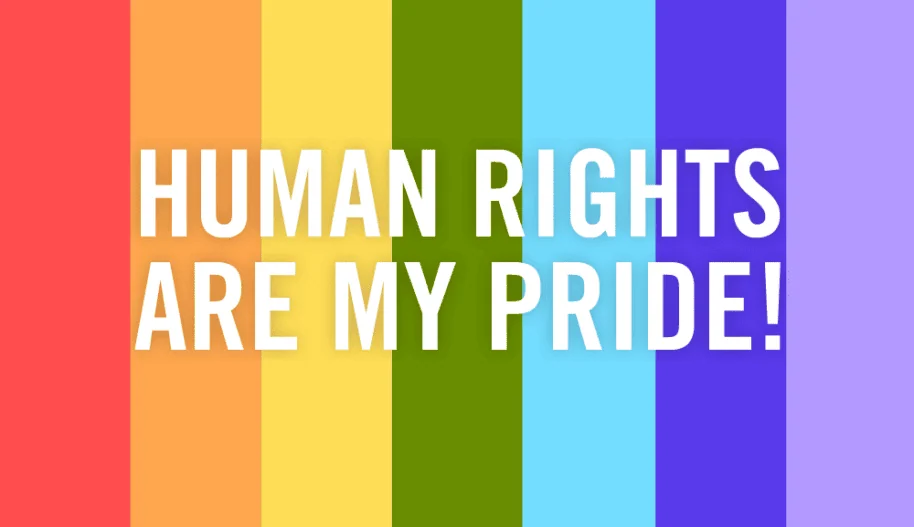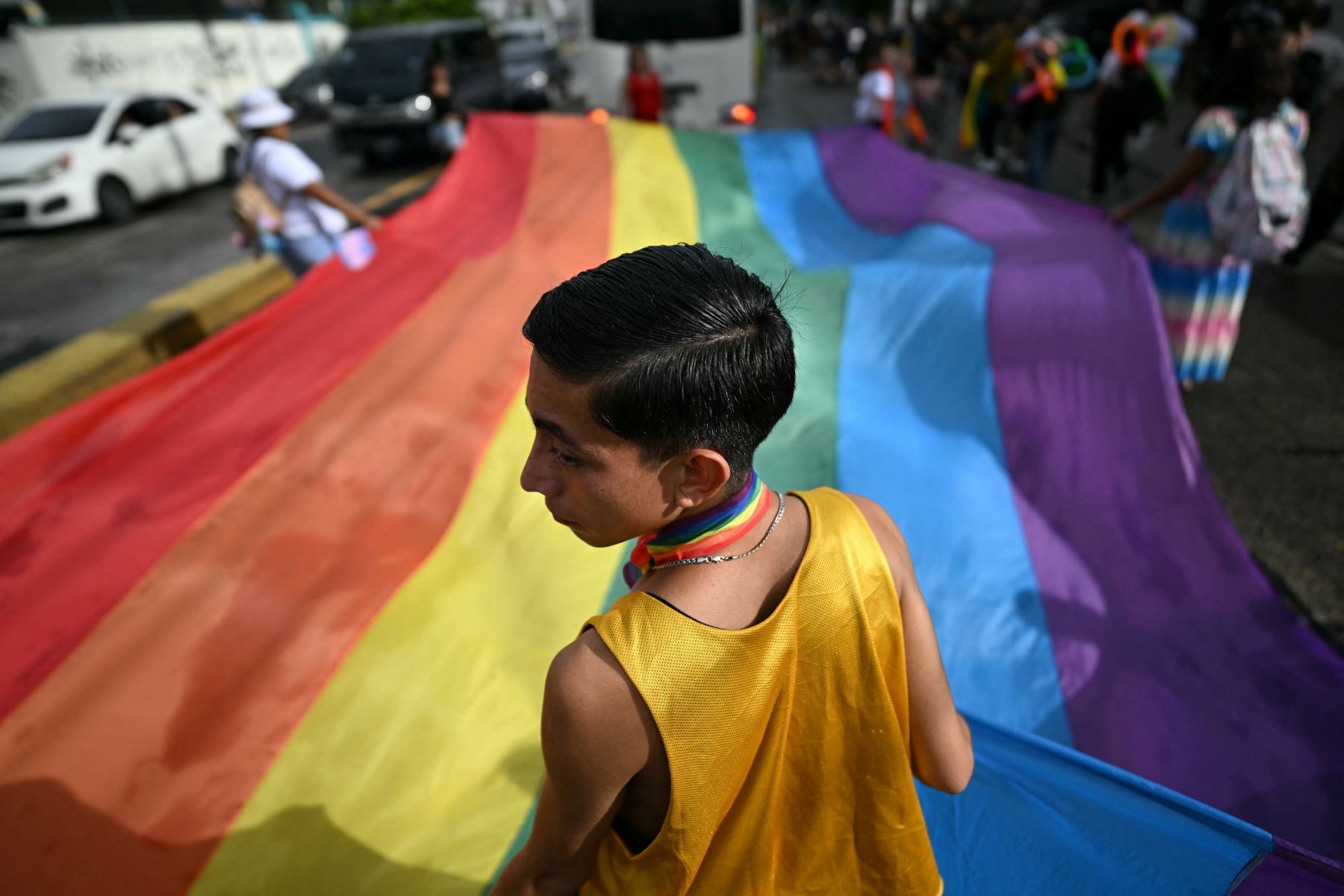June is Pride month – kicking off a summer of marches and events across the country and around the world.
While Pride is often thought of as a celebration, it originally began as a riot against police brutality at the Stonewall Inn in New York City. On June 28, 1969, the Stonewall Inn was raided by the police, as it had been on many occasions before, due to laws which required a ‘man’ or a ‘woman’ to be wearing clothing items which ‘matched’ their gender on their state-issued ID. As the 2SLGBTQQIA+ community in the Stonewall Inn, primarily led by trans women of colour, fought back, police brutality increased amid six days of riots which was a galvanizing force for 2SLGBTQQIA+ activism in the USA.
Pride is a protest
In many states around the world, Pride is still centrally and most importantly a protest which highlights, commemorates, and fights for the rights of 2SLGBTQQIA+ people.
Pride is marked differently in countries across the world. Many communities organize parades, marches and concerts that bring 2SLGBTQQIA+ people, allies, and the public together. But in other places, Pride is actively shut down by governments and law enforcement agencies, leading to security risks for those participating.
While Pride has increasingly become one of the most visible modes of celebrating queer joy and resistance, 2SLGBTQQIA+ activism, protest and ways of coming together as a community have always existed across the world in different iterations. There are also several places in the world where Pride as a concept may not resonate with local 2SLGBTQQIA+ people, and they prefer to celebrate their identities in subtler, more locally relevant ways.
Under attack for who we are
Two-spirit, lesbian, gay, bisexual, transgender, queer, or intersex (2SLGBTQQIA+) people face discrimination and violence from both state and non-state actors in many countries around the world.
Discrimination on the basis of one’s sexual orientation, gender identity and/or expression, and sex characteristics can have a devastating effect on physical, mental and emotional well-being for those forced to endure it.
Discrimination and violence against 2SLGBTQQIA+ people can come in many forms, from name-calling, bullying, harassment, to being denied a job or appropriate healthcare, to physical attacks. Protests to defend the human rights of 2SLGBTQQIA+ people also face bans and restrictions.

WHAT YOU CAN DO
Take action online: sign and share our actions
Let Pride march in Hungary
Budapest Pride is under threat. A new law banning assemblies that support LGBTQQIA+ rights is a direct attack on LGBTQQIA+ people, their allies, and the right to protest. Pride is a peaceful demonstration of equality and justice. The Hungarian authorities must ensure LGBTQQIA+ people can march freely and demand their rights peacefully, free from intimidation, harassment or violence.
Russia: Stop criminalization of LGBTQQIA+ people
The LGBTQQIA+ community is under threat in Russia. On November 30, 2023, the Supreme Court of Russia banned “the international public LGBT movement” as “extremist”. This has effectively outlawed any public advocacy or association with the LGBTQQIA+ community. Russia must urgently review this ruling to prevent widespread persecution of LGBTQQIA+ people.
Uganda: Make it safe online for LGBTQQIA+ people
Ugandan LGBTQQIA+ people and activists use social media platforms and other digital spaces to mobilize against human rights abuses and violations and to advocate for a range of human right issues. Despite the opportunities it presents, criminalization of LGBTQ people leads to them facing several challenges, including technology facilitated gender-based violence (TfGBV) while using digitally mediated spaces. Urge the Government of Uganda to act now to make it safe online for LGBTQQIA+ people.
USA/El Salvador: Free Andry
Andry José Hernández Romero, a 31-year old make-up artist and actor from Venezuela, came to the U.S. last year seeking safety. He had been targeted for being gay and for his political beliefs. Andry’s asylum hearing was scheduled for March 17. But two days before that hearing, the Trump administration unlawfully detained and expelled him to a maximum-security prison in El Salvador. 260 others were also illegally sent to CECOT, a notorious prison in El Salvador known for its brutal conditions. Call on U.S. authorities to immediately return Andry and all others, ensure they can continue their immigration proceedings in the U.S., and halt any further expulsions.
End anti-2SLGBTQQIA+ hate and violence in Canada
In the face of rising hate, violence, abuse and attacks on the human rights of 2SLGTBQQIA+ communities, we need urgent action to prevent hate from gaining more traction. During Pride Month, call on Prime Minister Mark Carney and the Government of Canada to reaffirm support and solidarity for 2SLGBTQQIA+ communities in Canada.
Halt anti-2SLGBTQQIA+ polices in Alberta
Sweeping anti-trans policy measures were recently introduced in Alberta. These measures are a direct attack on the rights of 2SLGBTQQIA+ Albertans, and will limit access to social support services, gender affirming medical care and education. Call on the Premier to immediately put a stop to this harmful plan.
Get involved in your local Pride marches, events and gatherings
Find your local events here.
Be sure to wear or display symbols of pride, such as rainbow flags, pins, or clothing, and encourage others to do the same. Check out the Pride 2025: mini mioche and Amnesty Canada launch “Love is a Human Right” t-shirt collection.
You can find paper petitions and other resources here.
Share your time, money and resources with 2SLGBTQQIA+-led organizations that provide support, advocacy, and services to community members. You can volunteer at 2SLGBTQQIA+-led community centers, participate in fundraising events, or simply raise awareness.
Be an accomplice to 2SLGBTQQIA+ friends, family members, colleagues, and acquaintances by offering your unconditional acceptance, love, and support. Create a safe and inclusive environment where everyone feels valued, respected, and free to be themselves.
Learn more about 2SLGBTQQIA+ rights
Take a course at Amnesty’s Human Rights Academy: Diversxs: the urgency to take action for LGBTIQ+ rights!
This 2-hour course aims to raise awareness, inform and call for action to reduce violence and discrimination against LGBTIQ+ people.
Header image: Supporters of the LGBTQ community hold a large rainbow flag as they take part in the Pride March in San Salvador on June 29, 2024. Photo by MARVIN RECINOS/AFP via Getty Images.






















